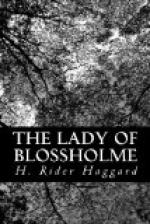The siege began, just such a siege as Cicely had suffered at Cranwell Towers. The first day the garrison of the Abbey scoffed at them from the walls. The second day they scoffed no longer, noting that the force of the besiegers increased, which it did hourly. The third day suddenly they let down the drawbridge and poured out on to it as though for a sortie, but when they perceived the scores of Bolle’s men waiting bow in hand and arrow on string, changed their minds and drew the bridge up again.
“They grow hungry and desperate,” said the shrewd Jacob. “Soon we shall have some message from them.”
He was right, since just before sunset a postern gate was opened and a man, holding a white flag above his head, was seen swimming across the moat. He scrambled out on the farther side, shook himself like a dog, and advanced slowly to where Bolle and the women stood upon the Abbey green out of arrow-shot from the walls. Indeed, Cicely, who was weak with dread and wretchedness, leaned against the oaken stake that had never been removed, to which once she was tied to be burned for witchcraft.
“Who is that man?” said Emlyn to her.
Cicely scanned the gaunt, bearded figure who walked haltingly like one that is sick.
“I know not—yes, yes, he puts me in mind of Jeffrey Stokes!”
“Jeffrey it is and no other,” said Emlyn, nodding her head. “Now what news does he bear, I wonder?”
Cicely made no reply, only clung to her stake and waited, with just such a heart as once she had waited there while the Abbey cook blew up his brands to fire her faggots. Jeffrey was opposite to her now; his sunken eyes fell upon her, and at the sight his bearded chin dropped, making his face look even more long and hollow than it had before.
“Ah!” he said, speaking to himself, “many wars and journeyings, months in an infidel galley, three days with not enough food to feed a rat and a bath in November water! Well, such things, to say nothing of a worse, turn men’s brains. Yet to think that I should live to see a daylight ghost in homely Blossholme, who never met with one before.”
Still staring he shook the water from his beard, then added, “Lay-brother or Captain Thomas Bolle, whichever you may be now-a-days, if you’re not a ghost also, give me a quart of strong ale and a loaf of bread, for I’m empty as a gutted herring, and floating heavenward, so to speak, who would stick upon this scurvy earth.”
“Jeffrey, Jeffrey,” broke in Cicely, “what news of your master? Emlyn, tell him that we still live. He does not understand.”
“Oh, you still live, do you?” he added slowly. “So the fire could not burn you after all, or Emlyn either. Well, then, there’s hope for every one, and perhaps hunger and Abbot Maldon’s knives cannot kill Christopher Harflete.”
“He lives, then, and is well?”




